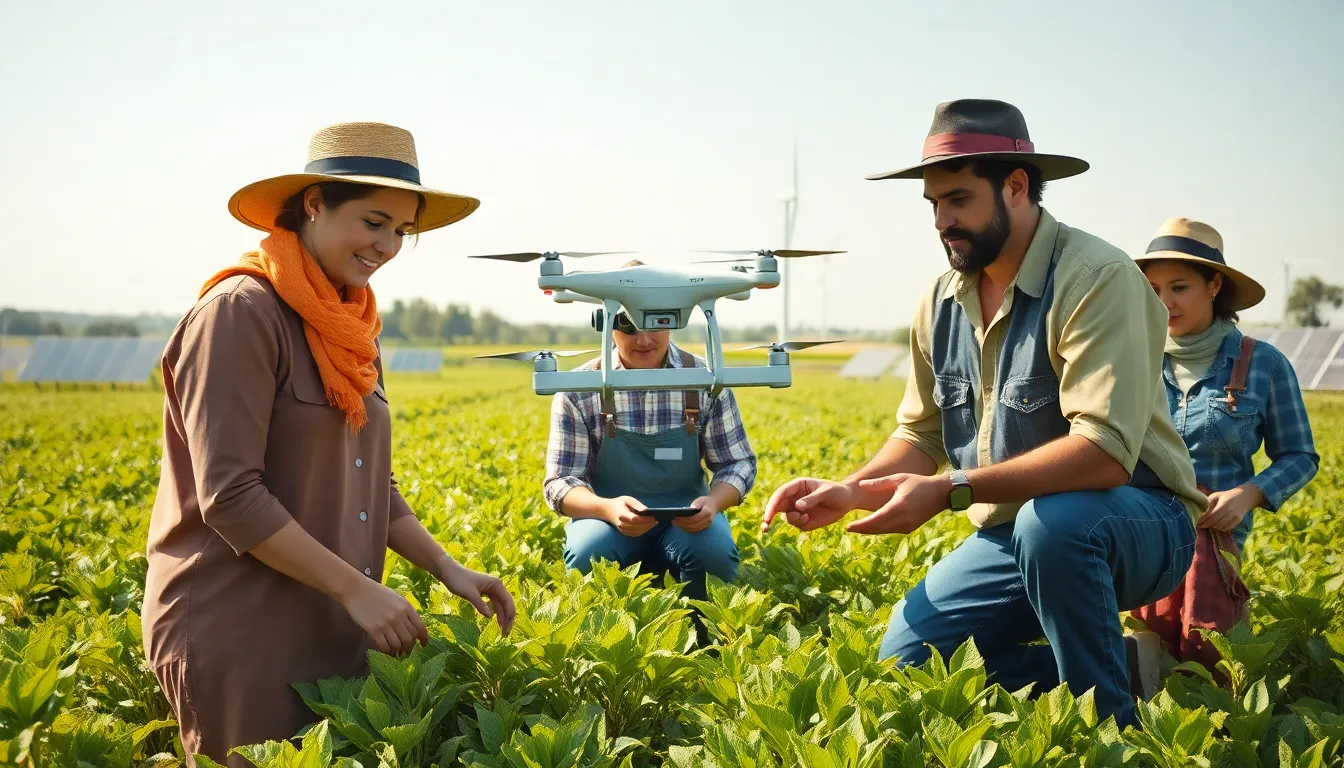In a world where technology often feels like a double-edged sword, sustainable ecosystem tech emerges as the hero we didn’t know we needed. Imagine a future where gadgets not only make life easier but also nurture the planet. It sounds like something out of a sci-fi movie, right? Well, it’s happening now, and it’s time to pay attention.
Table of Contents
ToggleOverview of Sustainable Ecosystem Tech
Sustainable ecosystem technology refers to solutions designed to balance ecological health with human needs. It addresses environmental issues while promoting efficiency and reducing waste. Innovations in this field include renewable energy systems, smart agriculture tools, and efficient water management techniques. Each of these technologies contributes to sustainable practices.
Renewable energy systems harness sunlight, wind, and water, providing clean energy sources. Solar panels and wind turbines generate electricity without depleting natural resources. Smart agriculture tools leverage data analytics and IoT devices, enabling farmers to optimize resource use. Techniques such as precision farming reduce water and fertilizer usage while increasing crop yields.
Water management techniques focus on conservation and purification. Smart sensors detect leaks in water distribution systems, minimizing waste. They also implement rainwater harvesting systems, providing alternative water sources for irrigation or domestic use.
Sustainable ecosystem technologies optimize urban planning, engaging communities in eco-friendly practices. Green buildings utilize sustainable materials and energy-efficient designs, minimizing their carbon footprint. Urban gardens and green roofs enhance biodiversity while improving air quality.
Adoption of these technologies leads to measurable environmental benefits. According to the International Renewable Energy Agency, transitioning to renewable energy can reduce global CO2 emissions by up to 70% by 2050. Such proactive measures ensure that future generations inherit a healthier planet.
Recognizing these innovations fosters a culture of sustainability. Embracing sustainable ecosystem technology is crucial for addressing pressing environmental challenges while enhancing quality of life.
Key Technologies in Sustainable Ecosystem Tech

Sustainable ecosystem tech employs various innovative solutions that harmonize ecological health with human activities.
Renewable Energy Solutions
Renewable energy solutions transform how society harnesses energy. Solar panels collect sunlight, wind turbines capture air flow, and hydropower facilities utilize water movement. These technologies lower dependence on fossil fuels, reducing greenhouse gas emissions dramatically. Implementing these systems can decrease global CO2 emissions by up to 70% by 2050. Initiatives for widespread adoption focus on improving energy efficiency and creating infrastructure that supports clean energy. Countries that invest in renewable sources often experience job growth in green technology sectors.
IoT and Smart Agriculture
IoT and smart agriculture optimize resource use in farming, leading to sustainable practices. Sensors track soil moisture levels, weather conditions, and crop health. This data enables farmers to make informed decisions, enhancing yield while conserving water and fertilizers. Integrating drones for monitoring can increase efficiency and provide real-time feedback. Farmers adopting smart technology often report reduced waste and improved crop quality. The convergence of these technologies not only boosts productivity but also promotes sustainability in food production.
Waste Management Innovations
Waste management innovations significantly improve how communities handle refuse. Advanced recycling systems utilize technology to sort and process materials effectively. Composting programs transform organic waste into valuable resources for soil enrichment. These practices minimize landfill usage while lowering pollution levels. Smart bins equipped with sensors detect fill levels, optimizing collection schedules and routes for waste management services. Integrating these technologies yields cleaner urban environments and supports the circular economy model. Communities embracing these methods often witness increased public awareness of sustainability efforts.
Benefits of Sustainable Ecosystem Tech
Sustainable ecosystem technology offers numerous benefits, sharply addressing environmental challenges while promoting a healthier economy. Embracing these innovations significantly impacts various sectors.
Environmental Impact
Sustainable ecosystem tech plays a pivotal role in mitigating climate change. Implementing renewable energy systems can reduce global CO2 emissions by up to 70% by 2050. Innovations in smart agriculture tools conserve water and fertilizers, improving resource efficiency and minimizing waste. Furthermore, integrating advanced recycling systems enhances waste management, promoting a circular economy. Cleaner urban environments arise as communities embrace eco-friendly practices, fostering public awareness of sustainability efforts.
Economic Advantages
Investments in sustainable technologies generate substantial economic benefits. Countries harnessing renewable energy often experience job growth in green technology sectors. Smart agriculture tools not only increase crop yield but also reduce input costs, leading to higher profitability for farmers. Additionally, urban planning that focuses on sustainability attracts eco-conscious businesses and tourists. Implementing waste management innovations improves community engagement and lowers disposal costs. Together, these factors contribute to a more robust, resilient economy.
Challenges and Limitations
Sustainable ecosystem technology encounters various challenges that hinder its widespread adoption. The effectiveness of these innovations depends on overcoming barriers in technology and society.
Technological Barriers
Technological limitations often restrict the scalability of sustainable ecosystem technology. Legacy systems may not integrate well with advanced renewable energy options. Additionally, high initial costs can deter investments in smart agriculture tools. Data privacy concerns arise from the use of IoT devices in farming, complicating user acceptance. Training for personnel in emerging tech fields can also pose difficulties, potentially slowing down progress. Improvement in infrastructure is necessary to support these innovations, ensuring they function effectively in diverse environments.
Social Acceptance
Social acceptance significantly impacts the success of sustainable ecosystem technology. Public skepticism around new technologies often delays adoption. Education plays a critical role in addressing misunderstandings about renewable energy and smart solutions. Community engagement initiatives can foster a sense of ownership, encouraging local populations to participate. Cultural perceptions of sustainability can influence attitudes towards eco-friendly practices. Building trust through transparency in technology implementation leads to higher acceptance rates. By addressing these social factors, the transition to sustainable solutions becomes more achievable.
Future Trends in Sustainable Ecosystem Tech
Emerging technologies continuously reshape sustainable ecosystems and drive progress. Next-generation renewable energy sources, such as solar and wind, are expected to become even more efficient and affordable. Research predicts that by 2030, advancements in solar panel technology could lead to efficiency rates exceeding 30%, significantly enhancing energy generation.
Data-driven agriculture tools are also advancing. The rise of AI-powered analytics enables farmers to make informed decisions based on real-time data, optimizing crop yields while conserving resources. Projections indicate that smart farming techniques could reduce water usage by up to 50% in the next decade.
Urban planning is transforming with innovative approaches to green architecture and sustainable transportation. Cities are beginning to integrate smart grids and electric vehicle infrastructure, aiming for a more resilient and eco-friendly urban landscape. The implementation of green roofs and vertical gardens is anticipated to rise by 25% in urban areas by 2025, contributing to improved air quality.
Waste management solutions are evolving through technologies designed to automate sorting and recycling processes. Advanced robotic systems are being developed to enhance efficiency, with the potential to increase recycling rates by 30%. Innovations in chemical recycling are also emerging, enabling the conversion of plastic waste back into usable raw materials.
Collaboration between government, private sectors, and communities is essential for successfully implementing these technologies. Engaging educational initiatives lead to increased public awareness and acceptance of sustainable practices. As people become more informed, the adoption of sustainable technologies accelerates, paving the way for a greener future.
Key trends in sustainable ecosystem tech underscore a commitment to addressing climate change and ensuring resource conservation. As technology advances, both efficiency and innovation play crucial roles in fostering a sustainable environment.
Sustainable ecosystem technology stands at the forefront of addressing environmental challenges while enhancing everyday life. By integrating innovative solutions like renewable energy systems and smart agriculture tools, it paves the way for a more resilient future.
The potential for these technologies to reduce emissions and improve resource efficiency is significant. However, overcoming barriers such as high initial costs and social acceptance is crucial for widespread adoption.
As communities engage with and embrace these advancements, the shift towards sustainability becomes increasingly attainable. The commitment to fostering a greener environment not only benefits the planet but also promotes economic growth and resilience for future generations.



